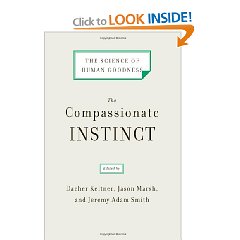
![]() Extraordinary Collection, Unique, Timely, No Notes
Extraordinary Collection, Unique, Timely, No Notes
Multiple literatures are in convergences, from the consciousness side to the global brain side to the waging peace side. I arrived at this book from the “beyond genes to culture” side, and list ten other recommended books spanning those literatures at the end of this review.
My notes:
+ 33 authors, 35 essays, drawn from the 2004-2009 timeframe as published in Greater Good, a magazine
+ Herb Alpert Foundation helped make this book possible
+ Three parts to the book: scientific roots; cultivating local goodness; cultivating goodness in society and politics
+ Science stories include evolutionary studies on peacemaking; neuroscientific experiments; and research into hormones like oxytocin that promote trust and generosity, meaning that kindness really is its own reward and that it is contagious
+ This is the point at which I write “no notes, infuriating,” normally a one star deduction
QUOTE: “Compassion is deeply rooted and has a biological basis in the brain and the body
+ Compassion by example is contagious; compassion demanded by force is not
+ Distress attracts empathy; empathy is useful in widening the circle of compassion
+ Political ideology is the OPPOSITE of compassion and empathy as ideology is exclusive and narrowing
+ CULTURE is the antidote to cults and closed circles
+ Multicultural exposure of the young is a vital factor in helping young adults see others as individuals rather than as “the other” [the genocide literature pioneered by Dr. Greg Stanton, conceptualizer of the eight stages of genocide, notes that stage one is the demonizing of “the other” into non-human status]
+ Empathy reduces fear
+ Compassion is a natural instinct–one story cites SLA Marshall's studies of war, that only 20% of those armed and on the front lines actually fire for effect–this means that the lengths we go to in order to instill a killer instinct and in “manufacturing contempt” for our enemies has huge costs to society
+ Fascinating discussion of how there is a natural tendency for individuals to seek to acquire power, but there is an EQUAL natural tendency for individuals to resist those who bully, abuse, or take more than a fair share
+ Forgiveness is an instinct, and is most common under conditions of plenty
+ An emerging science of forgiveness is finding that it improves health, relationships, and can be learned but we do not understand it completely and do not know how to promulgate the art and science to others
+ Gratitude greases the future and elevates one's reputation with those being thanked
+ Gratitude is contagious, employers are advised to welcome compassion in the workplace and NOT strive for “cold ruthless efficiency” which loses a certain humanity that actually IMPROVES workplace productivity
+ Emerging studies of positive or anomalously joyful workplaces
+ Power, even slight power, corrupts and degrades judgment; worse the abuser of power is oblivious to the brutality of what they are doing–I am reminded of the “kiss up kick down” attitude that prevails among some of our cold war civilians and their striving mid-grade population
+ Service, like gratitude and compassion, is self-healing
+ Poetry is about the possible; poetry is special because it elicits and inspires empathy
+ Adam Smith also wrote THEORY OF MORAL SENTIMENTS, THE (The Glasgow Edition of the Works and Correspondence of Adam Smith, 1)
+ Franz Kafka is quoted as saying that war is a failure of imagination
+ Science of social intelligence is emerging, focusing on three kinds of empathy: cognitive, emotional, and compassionate
+ “Diffusion of responsibility” can cripple crowd response to cry for help or offer help to a single individual
+ “Pluralistic ignorance” is a form of contagious apathy
+ Robert Reich contributes a piece on how the social contract is in ruins, leaders must help focus on commonalities. I cannot help but wonder what he thinks of Obama-Biden continuing Empire as Usual abroad, and Wall Street bail-outs at home
+ Trust matters, has an economic value and is essential to democracy. I think of The Cheating Culture: Why More Americans Are Doing Wrong to Get Ahead and Screwed: The Undeclared War Against the Middle Class – And What We Can Do about It (BK Currents (Paperback)) as well as Grand Illusion: The Myth of Voter Choice in a Two-Party Tyranny.
+ Good piece on how what you eat is ethics in motion
+ Excellent piece on apologies, discussing the four parts: acknowledgement of the offense; explanation; expression of remorse, shame and humility; and finally reparation. The same piece points out that US “apologies” for Abu Ghraib failed all four parts.
+ The same piece addresses how religious apologies to other religions, or cultural apologies between competing cultures, are a beginning toward truth and reconciliation and possibilities for peace
+ Desmond Tutu is in this book on the topic of truth & reconciliation, he writes “True reconciliation is based on foregiveness, and foregiveness is based on true confession, and confession is based on penitence, on contrition, on sorrow for what you have done.” See also Unspeakable Truths: Facing the Challenges of Truth Commissions.
Bottom line for my own interest in creating a prosperous world at peace: Foregiveness creates a possibility for a shared future; peace is made by widening the circle of emphathy and compassion.
The Dalai Lama is repreesented in the book, speaking of the importance of educating people as the first step–I am reminded of Thomas Jefferson saying that “A Nation's best defense is an educated citizenry.”
Five other recommendations (see all of my reviews in easy to access categories (98 of them) at Phi Beta Iota, the Public Intelligence Blog):
All Rise: Somebodies, Nobodies, and the Politics of Dignity (BK Currents (Hardcover))
Conscious Evolution: Awakening Our Social Potential
Nonzero: The Logic of Human Destiny
Collective Intelligence: Creating a Prosperous World at Peace
A More Secure World: Our Shared Responsibility–Report of the Secretary-General's High-level Panel on Threats, Challenges and Change




